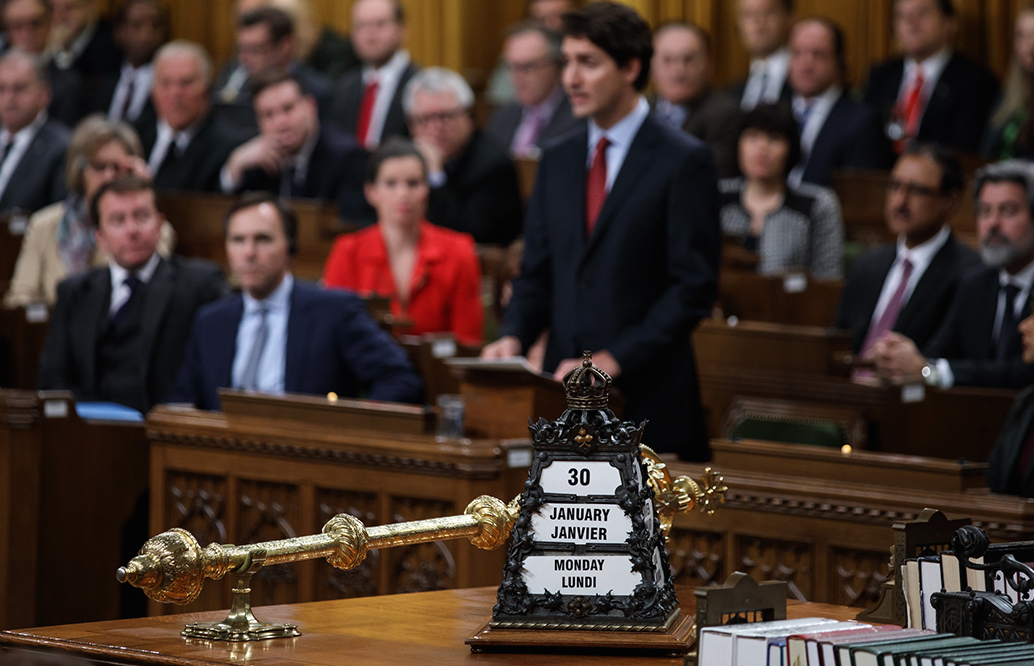Given the brouhaha last year around Parliament’s Islamophobia motion M-103, the quasi indifference to its resulting report seems perplexing. The motion itself repeatedly topped the news last year after initial Parliamentary debates in mid-February. Yet when the motion’s summary report was issued last month — almost a year later — the most striking upshot was the general apathy.
The media and public ignored the fact that the report recommended that January 29 — the anniversary of the horrific 2017 Quebec City mosque shooting — be designated as a national day of remembrance and action on islamophobia. This, just weeks after Liberal Quebec premier Philippe Couillard made headlines after siding with Quebec’s sovereigntist and conservative parties in opposing such a move.
For those who might have forgotten, after M-103 was introduced last year, its parliamentary sponsor Iqra Khalid received death threats among thousands of hate emails. After dominating headlines for weeks, the motion sparked protests and counter-protests across the country. Candidates for leadership of the federal Conservative Party debated the motion passionately, and Conservative leaders in Parliament offered a divisive alternative motion. Those opposed to the motion suggested it would somehow squelch criticism of Islam. Others cast doubt on the true intentions of the report proposed by the motion, asserting that it might propose measures to curtail civil liberties in an attempt to discourage anti-Muslim bigotry.
But while the M-103 report certainly does not live up to the fear-mongering, it also fails to live up to the hopes of many Canadians. After almost a year of work, and testimony from 78 witnesses, the Parliamentary Committee’s 30 recommendations provide little inspiration for Canada’s Muslims. Indeed, only two of the Committee’s 30 recommendations even mention Islamophobia: recommendation 30 calling for the national day of action on January 29, and recommendation 22 urging the government to take “a strong leadership role” against religious discrimination “including Islamophobia.”
Despite M-103’s obvious concern over Islamophobia in the wake of the Quebec City mosque shooting, the Committee’s report smothers real action on Islamophobia under generalized concerns about religious discrimination overall. A bit like saying that the best response to Black Lives Matter is to launch an “all lives matter” campaign. Canada’s Muslims have faced a significant rise in Islamophobia in recent years, and the Quebec City mosque attack provides concrete proof that anti-Muslim bigots are prepared to back their threats with violence.
It’s not to say that the Committee’s recommendations are ill-advised. Who could argue against better reporting on hate crimes, new tools to help religious minorities overcome racism in the employment market, or more funding for public awareness programs on religious discrimination. But the report ignores the core raison d’être of M-103: to address head-on the growing problem of Islamophobia in Canada today.
Surveys over the last two years repeatedly demonstrate that Islamophobia in Canada should be a serious concern for policymakers. A May, 2016 study by MARU/VCR&C found that 53 per cent of Canadians had an unfavourable opinion of Islam. A December, 2016 Abacus poll found that 79 per cent of Canadians feel there is “some” or “a lot” of discrimination towards Muslims. A February, 2017 survey by Angus Reid again found that 46 per cent of Canadians had an unfavourable opinion of Islam. And an October, 2017 survey by Angus Reid revealed that 46 per cent said that Islam was “damaging” Canada and Canadian society.
New immigrant communities — in which Muslim Canadians figure significantly — are less well-established, and less well-positioned to assert their rights in Canadian society. One Committee witness representing the South Asian Legal Clinic of Ontario said that his organization talks to clients “daily” who experience acts of “hate […] violence [and…] Islamophobia” who do not report such incidents either for fear of their safety, or because they don’t believe they would be supported if they did.
Yet while the Committee’s report highlights the fact that hate crimes against Muslims, or those perceived to be Muslim, has risen dramatically in recent years. And while the report also cites the challenge of hate crime reporting, specifically the problem of underreporting, the report still fails to put special focus on the need to protect Muslim Canadians.
The report also sidesteps the issue of Islamophobia in its refusal to even define Islamophobia. The report includes a section presenting different opinions on the term, and seems to suggest that there is insufficient consensus on it. The Conservative “minority report” seemed to delight in the fact that the Committee heard 26 different definitions of the term. Of course, ask different 26 people to define “potato,” and you’ll probably get 26 definitions of that word too. But a December, 2017 survey by EKOS Research found that, despite the political name games that MPs were playing in Ottawa, 70 per cent of Canadians are clear on what Islamophobia is, and 81 per cent believe such anti-Muslim racism is a problem in Canada.
So despite the behaviour of some Canadian politicians, the issue of Islamophobia is not a political game or joke. Muslim-Canadians suffer through it every day, as they face racist comments in public spaces, and as they fail to obtain jobs because of their name or clothing. And sadly, as we discovered early in 2017, some Muslim-Canadians lose their lives because of Islamophobia.
Muslim Canadians are not the only religious minority in Canada facing challenges, but as a relatively new immigrant community, they are among the least well-equipped to cope with religious discrimination. While the M-103 report fell short in addressing Islamophobia specifically, its broader recommendations are not unwelcome. What remains to be seen is whether the government will implement any of the report’s recommendations, or whether it too will respond with indifference.
Photo: Adam Scotti/PMO




